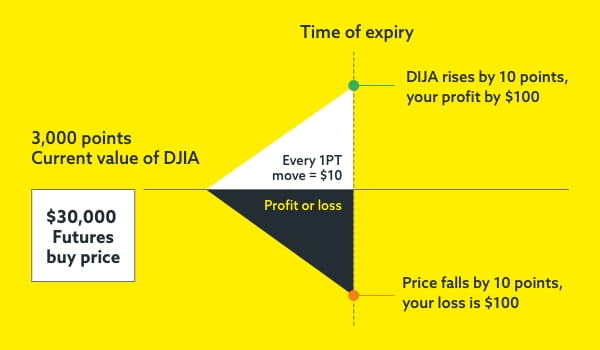
What is a Dow Jones future?
A Dow Jones future is a legally binding agreement between two parties that stipulates at which price they will exchange the value of the Dow Jones Industrial Average (DJIA) stock index (in cash) on a later date of expiry.
Unlike most futures contracts, the price of Dow futures are not based on a physical asset, but rather an index, which is nothing more than a number representing a group of stocks. In this case, the Dow Jones is a price-weighted average of the 30 most significant companies in the US. The companies are the largest in the US in terms of price per share, not market capitalisation.
Constituents of the index span nine sectors from industrials to healthcare, which include world-famous stocks like UnitedHealth Group, Goldman Sachs and Home Depo, as well as other household names like Apple, Boeing and McDonald’s.
Learn more about the Dow Jones index
The Dow Jones is often referred to as Wall Street, because it’s become so synonymous with the US stock market itself. However, it’s important to note that the S&P 500 has a broader cross section of the US equity market.
Dow Jones futures contracts are traded on the Chicago Mercantile Exchange. The instrument was created to enable investors and traders to speculate on the future value of the stocks that make up the Dow ahead of market open.
For example, say a company releases above-expectations earnings, traders have a pretty good idea that when the market opens the share price will rise. They could take advantage of the current difference by opening a futures position to buy the stock at the current price, and then sell it later at the new, higher price.
Dow futures contracts are traded on exchanges to keep them regulated and reduce counterparty risk. The exchange would step in if one party was unable to fulfil their end of the contract.
How are Dow Jones futures calculated?
Dow Jones futures are calculated using a multiplier of 10, which is known as leverage. So, if the stocks of the Dow Jones are currently trading at a combined value of 3,000 points, a single contract would be worth $30,000. For every point of movement in the index, a Dow futures contract will increase or decrease by $10.

The leveraged nature of Dow futures enable you to get a much larger exposure to the US stock market than would otherwise be possible. However, it also magnifies your risk – a fall of just 100 points could wipe out $10,000 of your position.
The DJIA itself is calculated using the share prices of each constituent, which are added together and divided by the ‘Dow divisor’ – a figure that is intended to smooth out anomalies. As the constituents are weighted, companies with larger share prices will have a greater influence over the end price of the index.
What is a standard Dow Jones future's lot size?
There are two types of Dow futures available, the regular DJIA futures mentioned above, and e-mini Dow contracts. While normal Dow futures are worth $10 per point of movement, the e-mini represents a $5 movement per tick.
How to trade Dow Jones 30 futures
You can trade Dow Jones futures in just a few steps:
- Open an account and deposit funds
- Launch the trading platform or learn how to use it with a demo account
- Build a trading strategy, it’s worth testing it in your demo account too
- Decide whether you’re going long (expecting DJIA to rise) or short (expecting DJIA to fall)
- Choose the expiry and price of futures contract you want
- Monitor the market and close your position
When you trade Dow Jones futures, you won’t be buying and selling a physical asset. So unlike commodity futures, you won’t end up with a delivery of the underlying. Instead, Dow futures are settled in cash, or can be rolled over into the following expiry.
Trading Dow Jones futures with City Index is done via CFDs and spread bets.*
Dow futures trading hours
Dow futures trade from 5pm (CT) Monday to 4pm (CT) Friday.
As futures trade outside of stock market hours, and nearly 24 hours a day, it allows traders and investors to get an idea of what sentiment is likely to be – that’s why futures prices often differ heavily from the underlying.As futures trade outside of stock market hours, and nearly 24 hours a day, it allows traders and investors to get an idea of what sentiment is likely to be – that’s why futures prices often differ heavily from the underlying.
During normal stock market hours, the price of DJIA futures are usually very close the underlying index value. The fluctuations in price come when out-of-hours activities cause changes in predictions for the index’s price.
When you trade with City Index, that’s from 10 pm (UTC) Monday to 9pm (UTCI) Friday.
See our full index futures offering
*Spread bets are not available outside of the UK.


